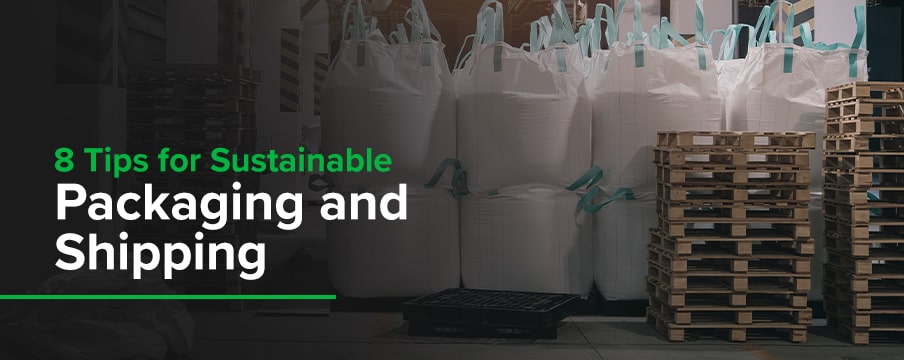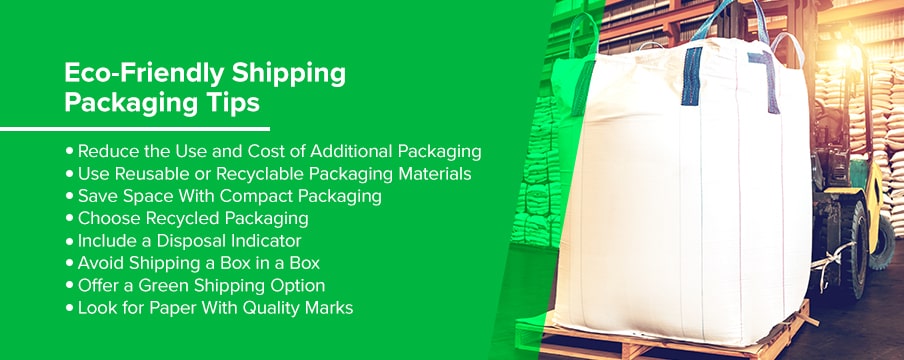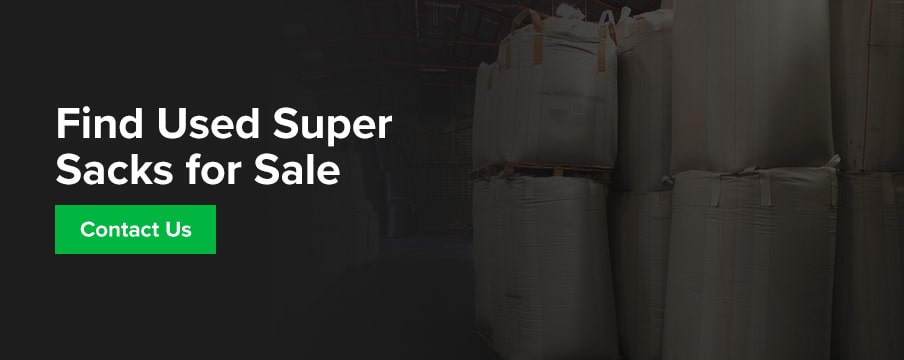8 Tips for Sustainable Packaging and Shipping
Flexible intermediate bulk containers (FIBC), also known as bulk bags or super sacks, are a sustainable, eco-friendly bulk packaging and shipping option for industries like agriculture, pharmaceuticals and construction. FIBC bags can be used to package and store various materials, make product storage and transportation easier and potentially reduce shipping costs. They typically transport heavier loads that may be too much for other packaging materials.
Bulk bags are an extremely effective and beneficial shipping option because they’re reusable and can be purchased used, allowing you to reduce costs even more. Learn how bulk bags make a great sustainable packaging and shipping option.
Sustainable FIBC Bags
Most standard shipping materials, like cardboard boxes and plastic bags, can only be used once and lack durability. These materials are typically disposed of immediately and often incorrectly. In comparison, bulk bags are incredibly sustainable. Since they can be reused and recycled, bulk bags have a long life span, keeping them out of landfills where significant amounts of other packaging materials end up.
Many bulk bags are made of 100% recycled materials, helping to keep harmful PET plastics out of the environment and put them to good use. Some FIBC bags are even designed to be bio-degradable. Natural fibers like cotton and plant-based fibers may also be used to construct bulk bags, as these components can safely break down when the bag is disposed of.
In addition to being highly sustainable, bulk bags have other advantages over traditional packaging materials and containers. For example, bulk bags undergo rigorous testing to meet several requirements and specifications before use. This testing helps ensure the bags are safe and can lift heavy loads. FIBC bags can also be efficiently stored mostly flat to save space. Unlike other containers, bulk bags avoid the need for additional packaging and can be stacked to maximize warehouse space.
Bulk bags can store and transport a wide range of materials. From sand and grain to sugar and potatoes to gravel and pellets to hazardous waste and chemical materials, many industries rely on bulk bag containers to effectively hold their materials. Consider whether this green packaging option may be for you.
Eco-Friendly Shipping Packaging Tips
Learn more about bulk container bags and sustainable business practices with these tips.
1. Reduce the Use and Cost of Additional Packaging
Additional packaging like pallets is necessary for storing and transporting traditional packaging materials. However, these secondary packaging materials can be costly. If possible, reduce the use of these materials and save money.
In most cases, bulk bags can be transported and stored without using pallets and other forms of costly secondary packaging. This allows you to save shipping costs and saves some extra space. Additionally, bulk bags have a low dead weight, allowing you to ship more for less since you can avoid paying extra for the weight of the packaging material. You’ll also save money using bulk bags because they can carry more material for less charge.
2. Use Reusable or Recyclable Packaging Materials
Using reusable or recyclable packaging helps keep harmful materials out of the environment and extends the life of the material. Reusable packaging includes resealable packaging, which is especially beneficial if your customer needs to return the product. Bulk bags are another excellent sustainable packaging material because they can be reused and recycled. This benefits the environment and helps you save costs on packaging products.
3. Save Space With Compact Packaging
Compact packaging helps reduce the carbon dioxide (CO2) footprint of shipping. Compact packaging also helps you reduce storage and shipping costs. Bulk bags take up minimal space. They can be folded up and tucked away when they’re not being used. Even when full of materials, bulk bags can be stacked, using less warehouse space. The less warehouse space you use, the more money you can save.
4. Choose Recycled Packaging
Regardless of the packaging material you use, it’s best to look for recycled versions. For example, many cardboard and plastic packaging materials can be made of recycled materials. Using recycled packaging means fewer raw materials must be added to the product, making it more eco-friendly.
As we mentioned, many bulk bags contain recycled PET or other plastics. You may also consider purchasing used bulk bags. As a method of recycling bulk bags, buying them used is an excellent great way to save money and keep the material out of the environment.
5. Include a Disposal Indicator
Packaging materials are often incorrectly disposed of because the recipient is unaware of how to do so properly. To help prevent this, include a disposal indicator on your package. This indicator can be a simple graphic or short sentence and should inform the recipient how to dispose of the packaging appropriately. For example, including the recycling symbol on your packaging indicates that the material should be recycled rather than thrown away.
6. Avoid Shipping a Box in a Box
If you’ve ever received a package that was a box inside another box, you understand how much of a waste of packaging material that can be. If possible, avoid using excess packaging material like putting a box in a box. This unnecessary use of materials can increase costs for you and increase the CO2 emissions from the shipment.
7. Offer a Green Shipping Option
Priority shipping is extremely common, though many fail to realize that priority shipping requires many transportation methods and contributes more CO2 emissions. Offering a green shipping option allows customers to choose a more environmentally-friendly way to ship their packages and gives you more time to arrange sustainable shipping.
8. Look for Paper With Quality Marks
If your packaging requires paper or cardboard, look for materials with PEFC™ or FSC® quality marks. These marks guarantee that the paper’s fibers were harvested from sustainably-managed forests. While some paper and cardboard products contain old paper fibers, many products still need fresh fibers. Choosing materials that have been harvested in an eco-friendly way helps your business be sustainable while supporting other sustainable companies.
Find Used Super Sacks for Sale
Sustainability is a priority for many businesses. Sustainable packaging can help you save money, improve efficiency and prevent pollution. Start your company’s sustainable business practices with used FIBC bags from Bulk Bag Reclamation. We offer a wide selection of used bulk bags that have been thoroughly inspected and cleaned to ensure you’re getting high-quality packaging materials at an affordable price. Browse our inventory to find what’s suitable for your needs.
If you’re unsure what type of FIBC bag you need, we’re happy to help — just request a quote!



